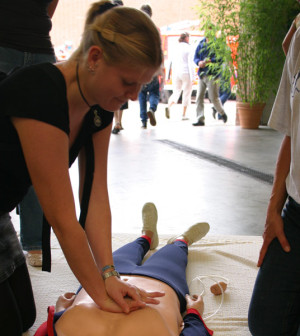- Recognizing the Signs of Hypothyroidism
- 10 Strategies to Overcome Insomnia
- Could Artificial Sweeteners Be Aging the Brain Faster?
- Techniques for Soothing Your Nervous System
- Does the Water in Your House Smell Funny? Here’s Why
- Can a Daily Dose of Apple Cider Vinegar Actually Aid Weight Loss?
- 6 Health Beverages That Can Actually Spike Your Blood Sugar
- Treatment Options for Social Anxiety Disorder
- Understanding the Connection Between Anxiety and Depression
- How Daily Prunes Can Influence Cholesterol and Inflammation
Study Questions Safety of Common Anesthesia Drug


More concern about the safety of a common anesthetic has been raised in a new study.
Patients who received the anesthesia drug etomidate during surgery might be at increased risk for cardiovascular problems or death, according to the study, which was published in the December issue of the journal Anesthesia & Analgesia.
An accompanying editorial in the journal said the findings add to growing concerns about the use of the drug.
The study compared about 2,100 patients who received etomidate and about 5,200 patients who received another intravenous anesthetic called propofol. All of the patients in the study underwent surgery that didn’t involve the heart.
Compared to those who received propofol, patients who received etomidate had a significantly higher risk of death within 30 days after surgery, according to a journal news release. The risk was 6.5 percent in the etomidate group and 2.5 percent in the propofol group, said study leader Dr. Ryu Komatsu, of the Cleveland Clinic in Ohio.
The patients in the etomidate group also had a 50 percent higher risk of major cardiovascular problems than those in the propofol group, according to the study.
Although the researchers found a higher risk of death and cardiac problems among patients who received etomidate compared to those who received propofol, the study did not prove a cause-and-effect relationship.
The findings are “striking and troubling,” but the study is not the first to raise safety concerns over etomidate, Dr. Matthieu Legrand and Dr. Benoit Plaud, of Paris-Diderot University, in France, said in an accompanying journal editorial.
“There is accumulating evidence for an association between mortality and etomidate use, both in critically ill patients and now in [non-critically ill] patients undergoing noncardiac surgery,” they said.
Etomidate has only short-lasting effects, and it’s not clear how it could affect patients several weeks after surgery, Legrand and Plaud said. Large-scale studies are needed to determine the safety of etomidate. Until then, it might be wise to use other anesthesia drugs, they suggested.
More information
The U.S. National Library of Medicine has more about anesthesia.
Source: HealthDay
Copyright © 2026 HealthDay. All rights reserved.










